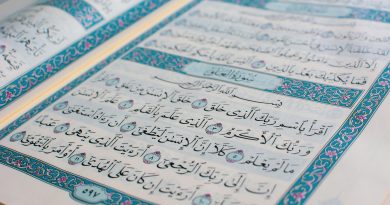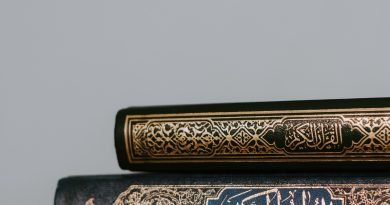Being Patient During and After Trials: Tafsir as-Sa’di
Allah says in surah Hud:
وَلَئِنْ أَذَقْنَا الْإِنسَانَ مِنَّا رَحْمَةً ثُمَّ نَزَعْنَاهَا مِنْهُ إِنَّهُ لَيَئُوسٌ كَفُورٌ * وَلَئِنْ أَذَقْنَاهُ نَعْمَاءَ بَعْدَ ضَرَّاءَ مَسَّتْهُ لَيَقُولَنَّ ذَهَبَ السَّيِّئَاتُ عَنِّي ۚ إِنَّهُ لَفَرِحٌ فَخُورٌ * إِلَّا الَّذِينَ صَبَرُوا وَعَمِلُوا الصَّالِحَاتِ أُولَـٰئِكَ لَهُم مَّغْفِرَةٌ وَأَجْرٌ كَبِيرٌ
And if We give man a taste of mercy from Us and then We withdraw it from him, indeed, he is despairing and ungrateful. * But if We give him a taste of favor after hardship has touched him, he will surely say, “Bad times have left me.” Indeed, he is exultant and boastful – * Except for those who are patient and do righteous deeds; those will have forgiveness and great reward. [11:9-11]
In his famous book of tafsir, sheikh ‘Abd al-Rahman ibn Naasir al-Sa’di commented on these ayaat by writing:
يخبر تعالى عن طبيعة الإنسان، أنه جاهل ظالم بأن الله إذا أذاقه منه رحمة كالصحة والرزق، والأولاد، ونحو ذلك، ثم نزعها منه، فإنه يستسلم لليأس، وينقاد للقنوط، فلا يرجو ثواب الله، ولا يخطر بباله أن الله سيردها أو مثلها، أو خيرا منها عليه. ـ
Allah is informing us of the nature of man, that he is ignorant and unjust because when Allah causes him to experience some of His mercy, such as health, provision, offspring, etc., and then later removes it from him, man gives in to hopelessness and lets himself be ruled by despair. He does not feel any hope for Allah’s reward, nor does it cross his mind that Allah might return that blessing to him, or might give him another similar blessing, or might even give him something better that what he had had.
وأنه إذا أذاقه رحمة من بعد ضراء مسته، أنه يفرح ويبطر، ويظن أنه سيدوم له ذلك الخير، ويقول: ذهب السيئات عني إنه لفرح فخور أي: فرح بما أوتي مما يوافق هوى نفسه، فخور بنعم الله على عباد الله، وذلك يحمله على الأشر والبطر والإعجاب بالنفس، والتكبر على الخلق، واحتقارهم وازدرائهم، وأي عيب أشد من هذا؟!! ـ
Another part of man’s nature is that when Allah causes him to experience mercy after having experienced difficulty, he is exultant and boastful, thinking that this goodness will continue for him without end. He will say,
ذَهَبَ السَّيِّئَاتُ عَنِّي
“Bad times have left me.”
إِنَّهُ لَفَرِحٌ فَخُورٌ
Indeed, he is exultant and boastful
i.e. delighting at the things he has been given that fulfill his own lusts and desires, boasting to Allah’s servants of the blessings Allah has given him. This attitude causes him to feel haughty, to look down on others, to feel a sense of self-amazement, and to consider himself above others, thinking little of them and holding them in low regard. And is there any worse character flaw than this?
وهذه طبيعة الإنسان من حيث هو، إلا من وفقه الله وأخرجه من هذا الخلق الذميم إلى ضده، وهم الذين صبروا أنفسهم عند الضراء فلم ييأسوا، وعند السراء فلم يبطروا، وعملوا الصالحات من واجبات ومستحبات. ـ
So this is man’s inherent disposition and natural default, except for those whom Allah grants success and takes them out of this blameworthy character trait into its opposite. Those are the people who make themselves firm in the face of difficulties without losing hope and make themselves consistent when blessed with good so that they do not feel haughty, and who
وَعَمِلُوا الصَّالِحَاتِ
do righteous deeds
both the obligatory and recommend good deeds.
أولئك لهم مغفرة لذنوبهم، يزول بها عنهم كل محذور. وأجر كبير وهو: الفوز بجنات النعيم، التي فيها ما تشتهيه الأنفس، وتلذ الأعين. ـ
أُولَـٰئِكَ لَهُم مَّغْفِرَةٌ
Those will have forgiveness
for their sins; every harm will fall away from them.
وَأَجْرٌ كَبِيرٌ
and a great reward
and that is the success of attaining the gardens of bliss in which one will have whatever his heart desires and his eyes will be pleased.
[Taysir al-Kareem al-Rahman pg. 434-435]
Source: https://tulayhah.wordpress.com/2020/05/28/being-patient-during-and-after-trials-tafsir-al-sadi/




